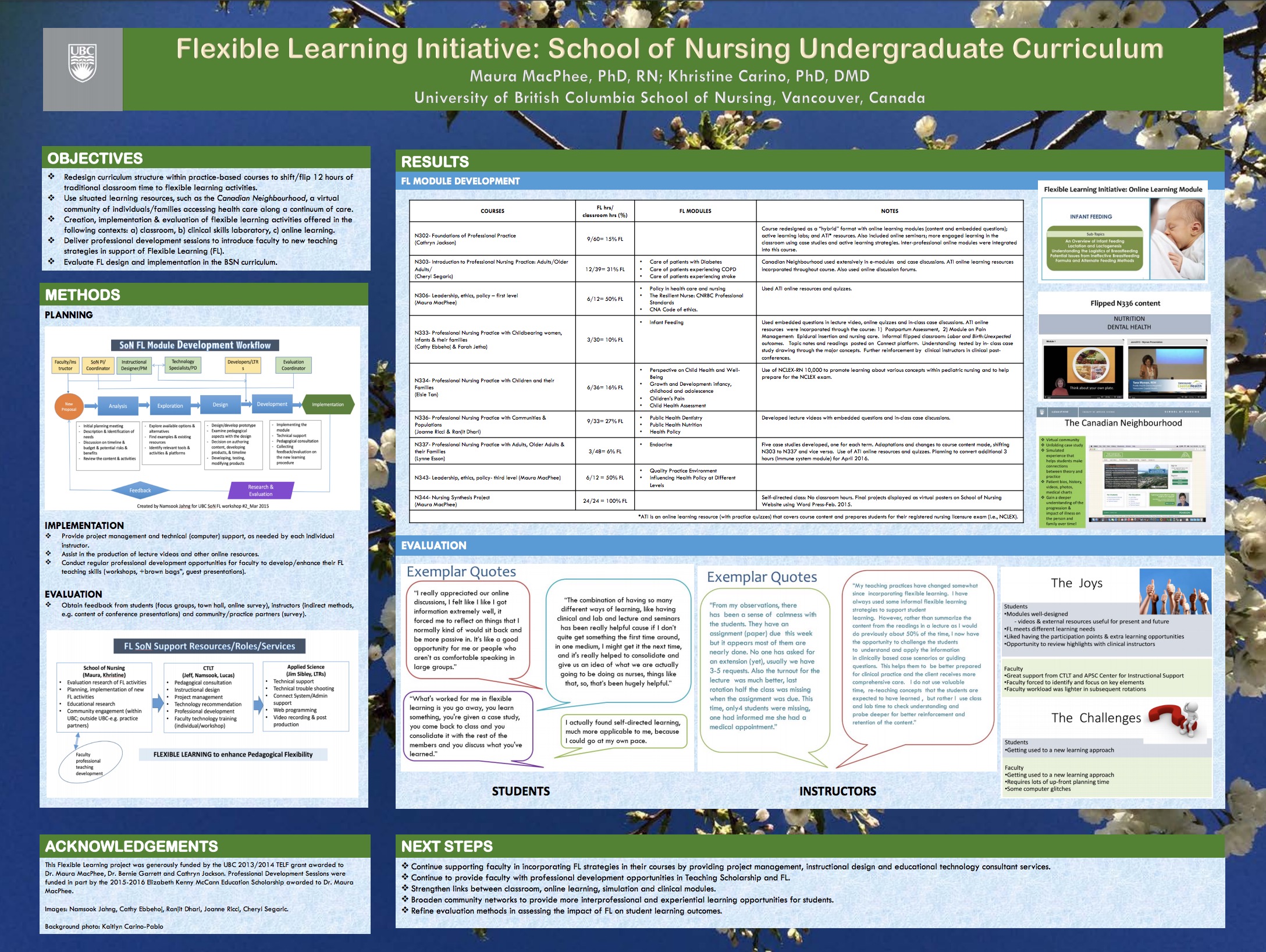| Title | School of Nursing – Blended Practice-based Courses |
|---|---|
| Faculty/College/Unit | Applied Science |
| Status | Completed |
| Duration | 1 Year |
| Initiation | 07/26/2013 |
| Completion | 03/31/2016 |
| Project Summary | *Special Call: Flexible Learning Projects* The undergraduate curriculum in the School of Nursing was under substantive review to streamline and better coordinate the delivery of content throughout the program by means of introducing new teaching and learning strategies. The overall objective of the project was to offer students with improved flexibility in scheduling of in-class days as well as a variety of learning opportunities such as augmented reality laboratory simulations, web-based video clips, interactive online modules, hands on learning, and small group activities. Prior to this project, most nursing courses were taught in large face-to-face lectures. This project enabled faculty to “flip” up to 30% of this content, thus significantly reducing classroom time and allowing students and supervisors more flexible scheduling of clinical practice placements. The new curriculum delivery model was designed to link core clinical content within and across the curriculum, reinforcing and integrating critical theoretical concepts and skills. An added outcome of this project has been a culture change among faculty in the School of Nursing, who have now become proficient in designing, delivering and evaluating new teaching and learning approaches across the entire program. |
| Funding Details | |
| Year 1: Project Year | Year 1 |
| Year 1: Funding Year | 2013/2014 |
| Year 1: Project Type | Large TLEF |
| Year 1: Principal Investigator | Maura MacPhee |
| Year 1: Funded Amount | 254,808 |
| Year 1: Team Members | Maura MacPhee, School of Nursing, Faculty of Applied Science |
| Year 1: TLEF Showcase |  |
| Project Report | Report-2013-FL-MacPhee-WEB.pdf |
| Project Outcomes | Products & achievements: Redesigned curriculum for practice-based courses; 12.5-100% reduced seat time in 11 courses with; lecture videos; online modules and module templates; worksheets and quizzes; common core health policy module; case studies; situated learning resources and activities; N344 synthesis project site; professional development sessions for faculty; student town hall meetings. Intended outcomes/themes:
Evaluation approach: A mixed methods approach was used:
Findings: Student focus group sessions and Town Hall:
Student Pedagogy Experience Survey:
Education research:
Informal feedback from faculty:
Dissemination: MacPhee, Dhari, Ricci, Carino (2016). Student-Faculty-Community Flexible Learning Partnerships. UBC Spring Institute 2016. MacPhee, Carino (2016). Flexible Learning Initiative: School of Nursing Undergraduate Curriculum. UBC TELF Showcase 2016. Dhari, Ricci (2016). Community Health Transformation: Success within an Accelerated BSN Program. Nurse Educator Summit 2016, Nashville, TN. MacPhee, Dhari, Ricci, Ebbehoj, Segaric (2016). Flexible Learning in Nursing, CASN Accreditation. Bravo, Carino, Lyon, Briseno-Garzon, MacPhee (2015). Use of Reflection to Improve Student Metacognition about their Learning, STLHE 2015, Vancouver. Garrett, Ricci, Carino, Jahng, Dhari (2015). Creating, Implementing and Evaluating Flipped Classroom E-Learning, STLHE 2015, Vancouver. MacPhee, Ebbehoj, Dhari, Ricci, Segaric (2015). Flexible Learning in Nursing, UBC CTLT Spring Institute 2015. MacPhee, Garrett, Jackson, Legacy (2014). Flexible Learning Innovations and Outcomes within an Undergraduate Nursing Curriculum, ISSoTL 2014, Quebec City. Legacy (2014). Applications for Flexible Learning at UBC, EKM Forum 2014, UBC School of Nursing. MacPhee (2014). Applications for Curriculum Redesign in the SoN, EKM Forum 2014, UBC School of Nursing. Sustainability: Faculty development has been the greatest sustainability factor. With CTLT support, faculty members have learned how to create their own curriculum materials, and they are working together to provide more seamless delivery of content. Changes in our knowledge of patient/population needs, treatment strategies and healthcare systems are constantly changing. The FL project has enabled faculty to update and create new curriculum as needed—to keep with the fast-paced changes in health care. Our faculty members have the means, skills and confidence now to create and deliver undergraduate nursing curriculum that is truly flexible and adaptable to new learners. |